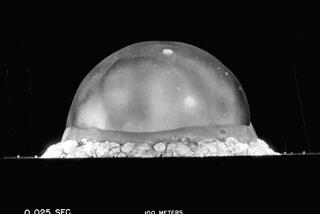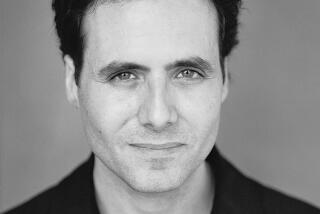Book Review : Speculating on the Big Questions
- Share via
Deep Time: The Journey of a Single Subatomic Particle From the Moment of Creation to the Death of the Universe and Beyond by David Darling (Delacorte Press: $17.95; 192 pages)
Most books about the history of the universe and everything in it begin with the Big Bang and come up to the present day. By now it is a familiar story: The gigantic explosion that started it all, the formation of the light elements, followed by stars, supernovas, the heavy elements, planets, primordial soup, amino acids, DNA, evolution and, voila , you and me.
David Darling’s “Deep Time” goes one or two or three steps further. It begins with the Big Bang all right, sweeps through the present and soars off more than a hundred billion years into the future, when the implications of quantum theory reach full flower and we discover that mind is the most important thing there is. It has made the universe go.
“Only through observership could the universe become, by progressive stages, conscious of itself, comprehending of itself, and, ultimately, selective and creative of itself,” Darling writes near the end of the book.
“Presently it astonished itself by realizing that it had this power--that it was the self-creating universe. . . . Thus was the terrific conception revealed. That mind was what transformed the abstract mathematical relationships of the world into perceived reality, gave substance to the equations. That there was nothing concrete outside the mind. That mind created reality--inner and outer--and, at the same time, allowed the underlying mathematical relationships to be symbolized and better understood.”
And that’s not all. The upshot of this discovery, according to Darling, is that the past and the present and the future in some sense are all one. The future already exists in mind, and the past has not ceased to be. “The creation of the universe was in some curious way bound up intimately with what was to come,” he says at one point. Mathematics and physics and God and man are all one, too.
At least, that’s what I think he says. The end of the book gets a tad hokey--but that’s a matter of taste (as what isn’t?).
But I’m giving away the end. Let me go back to the beginning. Darling, a science writer with degrees in physics and astronomy, tells us at the outset that he is always dissatisfied with books about cosmology because they never deliver what they promise. They never answer the big questions like where did the universe come from and what is the meaning of it all? He aims to rectify that failing.
The trouble is that nobody knows the answers for sure. In fact, nobody knows whether those ultimate questions have any answers.
The result is a book that is grounded in science but skirts the edges of science fiction, blurring the distinction between the two. It’s like one of those fictionalized biographies by Irving Stone. Like Stone, Darling begins with what is known and fills in the interstices with plausible guesses. And who’s to say that he is wrong?
“Deep Time” has many strengths. Darling crams a lot of information into 192 pages, and he does it by not getting bogged down in details, as many more sober books about cosmology do. This is not to say that he plays fast and loose with the facts. Rather, he has the right level of generality for interested nonspecialists.
In addition, Darling writes very well despite a tendency to overwrite here and there. His descriptions have a breathless tone, which can be put down to his great affection for the subject. He has obviously thought a lot about it. Along the way, he muses about what he is describing. Here is part of his discussion of the start of life on Earth:
“Was there some magical moment when the first living thing appeared? A dramatic instant when a flash of lightning, say, struck the primal ocean and caused two innocuous-looking molecules, by chance, to fuse and come alive? Of course not. That never--never could have--happened. For the simple reason that there is no sharp distinction between living matter and nonliving. No molecular Adam . . . . The juncture at which life begins is defined by us , not by nature.”
Ultimately, whether Darling’s conclusions are right or not, he deserves credit for tackling the questions. This is a speculative and provocative book that extends what is known into what is unknown. It is not just another book on cosmology, of which there are many good ones in print. The emphasis here is on wonder.
But I’m still not sure I know where the universe came from and what it all means.
More to Read
Sign up for our Book Club newsletter
Get the latest news, events and more from the Los Angeles Times Book Club, and help us get L.A. reading and talking.
You may occasionally receive promotional content from the Los Angeles Times.










